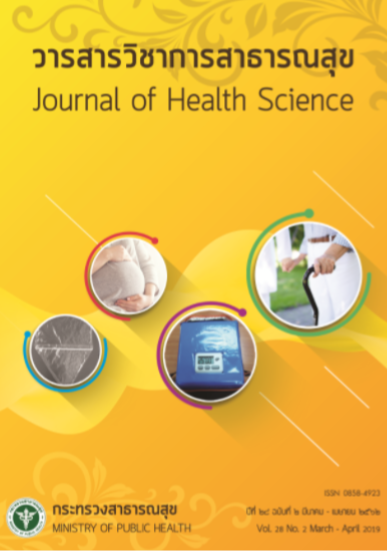ประสิทธิผลของการรักษาด้วยการออกกำลังกายตามแนวคิด Movement System Impairment ต่อระดับความสามารถในการทำกิจกรรมต่างๆ และระดับความรุนแรงของข้อเข่าเสื่อมในผู้ป่วยข้อเข่าเสื่อมเรื้อรัง
คำสำคัญ:
ข้อเข่าเสื่อม, ปวดเข่า, การออกกำลังกายในข้อเข่าเสื่อม, โปรแกรม Movement System Impairment (MSI)บทคัดย่อ
การศึกษานี้มีวัตถุประสงค์เพื่อศึกษาประสิทธิผลของการรักษาผู้สูงอายุข้อเข่าเสื่อมด้วยแนวคิด Movement System Impairment (MSI) ต่ออาการฝืดขัดของข้อ อาการปวด การเคลื่อนไหวในกิจวัตรประจำวัน การเคลื่อนไหวในการออกกำลังกายและการทำกิจกรรมอื่นๆ และคุณภาพชีวิต รวมถึงการเปลี่ยนแปลงระดับความรุนแรงของอาการข้อเข่าเสื่อม ในการศึกษาครั้งนี้เป็นการวิจัยเชิงทดลองแบบกลุ่มตัวอย่างกลุ่มเดียววัดก่อนและหลังการทดลอง ประชากรที่ใช้ในการศึกษาครั้งนี้ เป็นผู้ป่วยโรคข้อเข่าเสื่อมเรื้อรังตั้งแต่ 6 เดือนขึ้นไปในชุมชนอำเภอลาดบัวหลวง จังหวัดพระนครศรีอยุธยา จำนวน 57 คน ตั้งแต่เดือนธันวาคม 2559 – เมษายน 2560 ส่วนใหญ่เป็นเพศหญิง คิดเป็นร้อยละ 75.43 อายุส่วนใหญ่อยู่ระหว่าง 60-69 ปี คิดเป็นร้อยละ 52.63 โดยการกำหนดกลุ่มตัวอย่างในการวิจัยใช้ตารางของ Krejcie และ Morgan มีขั้นตอนการวิจัยทั้งสิ้น 3 ขั้นตอนคือ (1) ก่อนได้รับการรักษา ผู้เข้าร่วมการศึกษาจะได้รับการตรวจประเมินด้วยด้วยแบบประเมิน Oxford Knee Score และแบบประเมิน Knee Injury and Osteoarthritis Outcome Score (KOOS) 5 ด้าน ได้แก่ อาการปวด อาการแสดง การเคลื่อนไหวในชีวิตประจำวัน การเคลื่อนไหวในการออกกำลังกาย และการทำกิจกรรมอื่นๆ และคุณภาพชีวิต (2) ให้การรักษาตามแนวคิด MSI ใน ผู้ป่วยแต่ละราย เป็นระยะเวลา 60 ชั่วโมง (1 ชั่วโมงต่อครั้ง 4 ครั้งต่อสัปดาห์ เป็นระยะเวลาทั้งสิ้น 20 สัปดาห์) และ (3) การตรวจประเมินหลังการการรักษาด้วยแบบประเมิน KOOS 5 ด้าน และประเมินระดับความรุนแรงของข้อเข่าเสื่อมด้วยแบบประเมิน Oxford Knee Score เพื่อวิเคราะห์ผลการศึกษาเปรียบเทียบผลก่อนและหลังการรักษาโดยใช้ สถิติเชิงพรรณนา วิเคราะห์ข้อมูลพื้นฐานของผู้เข้าร่วมการศึกษา สถิติ Pair t-test ใช้สำหรับวิเคราะห์เปรียบเทียบค่าเฉลี่ยของคะแนน KOOS 5 ด้าน ก่อนและหลังการรักษาและสถิติ Wilcoxon Signed Rank test ใช้สำหรับวิเคราะห์เปรียบเทียบระดับความรุนแรงของข้อเข่าเสื่อมด้วยแบบประเมิน Oxford Knee Score ก่อนและหลังการรักษา โดยกำหนดค่าระดับความเชื่อมั่น 95% และความคาดเคลื่อนไม่เกิน 0.05 ผลการศึกษาพบว่า หลังจากได้รับการรักษาตามแนวคิด MSI ผู้เข้าร่วมการศึกษามีระดับคะแนน KOOS เพิ่มขึ้นทั้ง 5 ด้านอย่างมีนัยสำคัญทางสถิติ (p < 0.001 ทั้ง 5 ด้าน) และผลการประเมิน Oxford Knee Score หลังจากจบโปรแกรมการออกกำลังกาย MSI พบว่า ผู้เข้าร่วมการศึกษามีระดับความรุนแรงของข้อเข่าเสื่อมลดลงอย่างมีนัยสำคัญทางสถิติ (p< 0.001) จากผลการรักษาด้วยวิธีการออกกำลังกายตามแนวคิด MSI ทำให้ผู้ป่วยเข่าเสื่อมในชุมชนอำเภอลาดบัวหลวง จังหวัดพระนครศรีอยุธยา มีลักษณะอาการของโรคข้อเข่าเสื่อมในด้านต่างๆ ทั้ง 5 ด้านดีขึ้น ได้แก่ การเปลี่ยนแปลงของอาการปวด อาการแสดงการเคลื่อนไหวในชีวิตประจำวัน การเคลื่อนไหวในการออกกำลังกาย และการทำกิจกรรมอื่นๆ และคุณภาพชีวิต นอกจากนี้ยังทำให้ระดับความรุนแรงของอาการข้อเข่าเสื่อมลดลงอีกด้วย การออกกำลังกายตามแนวคิด MSI ส่งเสริมให้ผู้ป่วยข้อเข่าเสื่อมดูแลสุขภาพของข้อเข่าและสามารถนำไปใช้ในชีวิตประจำวันได้อย่างเหมาะสม มีความมั่นใจในการดูแลป้องกันความเสื่อมที่จะเกิดขึ้นจากอาการปวดข้อเข่า และการใช้งานข้อเข่าที่ผิดปกติได้ ทั้งนี้การศึกษาครั้งต่อไป ควรมีการติดตามให้ความรู้และปรับพฤติกรรมในผู้เข้าร่วมการศึกษาในกลุ่มที่ระดับความรุนแรงของข้อเข่าเสื่อมไม่เปลี่ยนแปลงและปรับแนวทางการออกกำลังกายให้มีความน่าสนใจยิ่งขึ้น รวมทั้งให้ผู้ดูแลและนักกายภาพบำบัดติดตามผลการรักษาอย่างต่อเนื่อง
Downloads
ดาวน์โหลด
เผยแพร่แล้ว
วิธีการอ้างอิง
ฉบับ
บท
การอนุญาต
ลิขสิทธิ์ (c) 2019 Journal of Health Science - วารสารวิชาการสาธารณสุข

This work is licensed under a Creative Commons Attribution-NonCommercial-NoDerivatives 4.0 International License.







